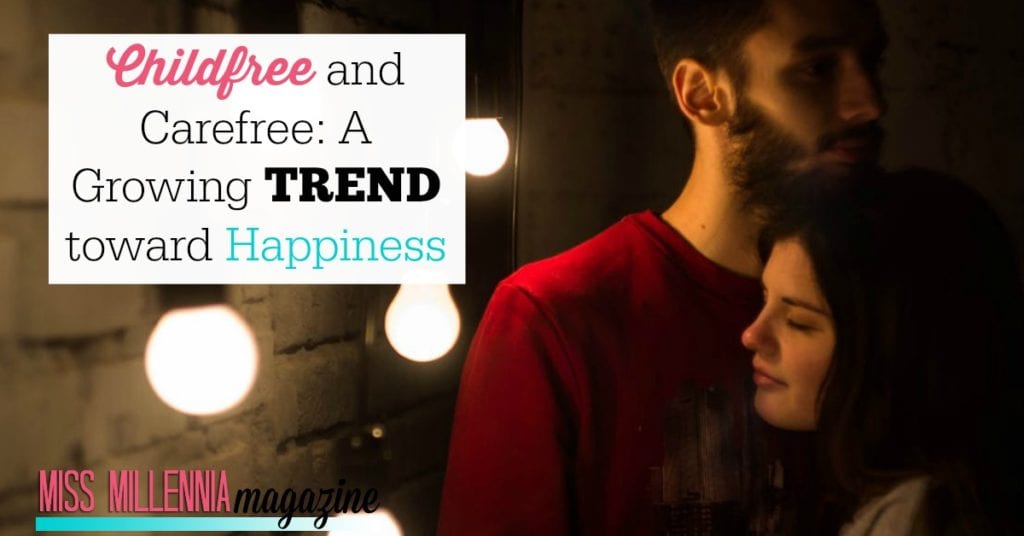Childfree and Carefree: A Growing Trend toward Happiness
Marriage is most traditionally thought of as the promise and commitment between two people to spend their lives together; however, it has also, since its origins, held another more underlying meaning: the means to propagation, i.e. the first step in starting a family. There was a time when no married couple would even consider not having children; it simply was not done. Sure, there have always been men and women who remained lifelong singles (not to say they weren’t subject to societal scrutiny too); however, it was generally expected that when you made a promise to wed, you also made a promise to reproduce. Marriage was not a commitment to just your beloved, but to the two, four, even twelve children you were to birth and raise with him.

With the growth of women’s rights, contraceptives (including birth control), and abortion laws, times have certainly changed, and continue to. It is no longer uncommon for married couples to opt out of having kids, and, in fact, there are many more than you may think. Data from the 2010 U.S. Census reported that 1 in 5 women aged 40-45 do not have children—a drastic change from the 1970 Census in which the statistic was just 1 in 10. A later study showed that 43 percent of Generation X women (those born between the mid-1960s and 70s) have no children. Because these numbers do not reflect solely voluntarily childfree couples (versus sterile ones), another 2011 study was done by the Center for Work-Life Policy, which confirmed a surprisingly large number of “Gen Xers” delaying parenthood or forgoing it completely. Now that the child-bearing age group is extending into Generation Y, the question is: will this trend continue? Or, perhaps even continue to grow?
Obviously, children are very important. Without offspring, the human race would cease to exist, and everything we did would be of no significance at all (for a scary look at a world like this, see the movie Children of Men starring Clive Owen—intense stuff!). However, if you ask parents why they had children, I highly doubt they would give you such a cosmic, biological reason. They would most likely say as we’ve heard so often, that they love being parents. Children bring insurmountable joy and unparalleled life experiences of personal growth and meaning. While I’m not denying any of this, there is data that might.
A study conducted late last year by the Open University in the U.K. proved—to the contrary of happy parents everywhere—that couples without children actually have happier marriages. The researchers interviewed and surveyed over 5,000 people and found that childless couples felt both more satisfied with their relationships and more valued by their significant other. You may find this surprising, but perhaps you haven’t considered the cons of having kids. Nothing sounds more miserable to me than changing diapers, nursing, cleaning up messes, preventing crying or whining, or biting, or fighting, or running…to name a few. Not to mention the huge financial responsibilities. I hate to minimize them into fiscal assets (or liabilities), but you can’t disregard how expensive children are—from diapers and toys, to you know, a $250,000 college education. And although Jessie J says, “money can’t buy us happiness,” it can buy us a lot of things (or experiences) we would otherwise be sacrificing to raise children. It makes sense how these sacrifices and strains can put a strain on the commitment that led to them in the first place—your marriage.

Of course, determining what makes people happy is hugely subjective. Therefore, I won’t spend time trying to compare the happiness of having children to the happiness of a two-week Caribbean cruise (something tells me the criteria for each would be a little different). However, what I will say is: both decisions are completely voluntary. Just because the world needs children to function does not mean they need to be yours. Congratulations—the pressure is off!
Note too that these are not just my opinions, but statistical facts; a 2011 MacArthur Research Network survey found that “only half of U.S. consumers cite marriage and parenthood as required milestones of adulthood.” Whereas 100 years ago, society likely would’ve looked down on you for being married without children, nowadays you might be looked down on for thinking married couples need them. Thus, childlessness is becoming not only widely accepted, but also—just maybe—the norm.
I did not wish in writing this to deter you from having kids (as nasty as dirty diapers and projectile vomiting undoubtedly are). I simply meant to inform you that marriage and reproduction are no longer one in the same; more and more people get married with no intent of ever having kids, and 1 out of every 2 people don’t even consider having kids necessary. So, it’s really up to you. If you truly want kids and feel you are mentally, emotionally, and financially prepared to do so—you should absolutely have kids. If you want to get married and not have kids, or if you don’t want to marry at all, that’s perfectly acceptable too! It’s 2014 and the possibilities are endless. Do whatever makes you and your partner happy; just remember—happiness almost always comes with a price or two.
Sources and Resources:
https://atlanta.cbslocal.com/2014/01/14/study-couples-without-children-have-happier-marriages/
https://townhall.com/tipsheet/cortneyobrien/2014/02/23/pew-are-couples-happier-without-kids-n1798671







